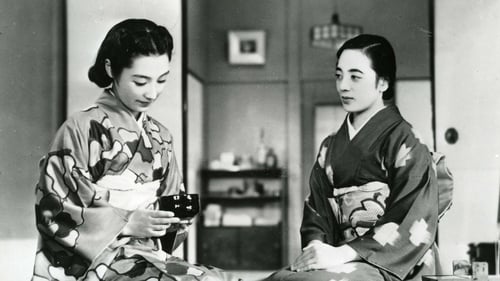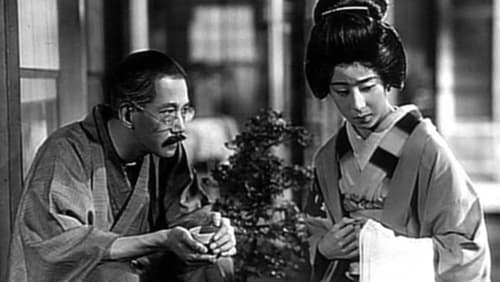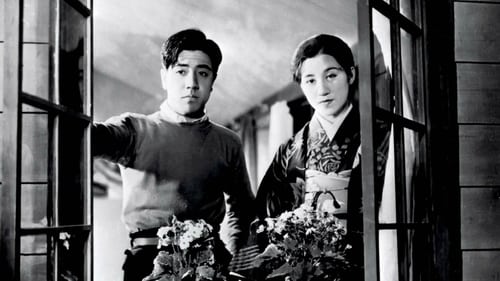Setsuko Shinobu
Nacimiento : 1914-07-22, Tokyo, Japan

Tsuneko

Kiyoshi, un joven oficial de clase acomodada, es enviado a la Península de Izu, cerca de Tokio. No hay lugar dónde vivir y el templo local permanece lleno de gente que ha debido alejarse de sus hogares como consecuencia de la guerra. Unos lugareños le indican a Kiyoshi que el dueño de un restaurante cercano y padre de dos hijas solteras tiene una habitación libre en su casa. Las relaciones entre los miembros de la familia no volverán a ser las mismas luego de la llegada del nuevo inquilino.
Estrenada el 30 de agosto de 1945, apenas dos semanas después de la rendición nipona, Las jóvenes de Izu fue el primer estreno cinematográfico japonés luego del fin de la Segunda Guerra. Gosho había realizado apenas cuatro películas durante esos años y ninguna de ellas puede ser considerada artículo de propaganda.

Pretty Oshige is deceived by her first love. After this, she lives a hard lifestyle, working at a number of jobs. Her only pleasure is her nephew, who eventually becomes a merchant marine. When Oshige meets her old love ten years later, she is able to forgive him and even thank him for the path her life has taken.

Inoue was something of a rarity in the sense, that he was a Shochiku house director who seems to have worked mostly in period films, often with big stars like Hasegawa or Bando. "Sumidagawa", named after the river that runs through Tokyo, is also a period film, but thematically a modern one. All the themes that you associate with the normal Shochiku women's films set in the present day are in this film, just in a different context: love, the planning of a marriage, career, family relations and societal melancholy. There is no action or swordplay.

Después de la muerte del patriarca, los Toda, una familia de clase alta, está posando para una foto. Al mismo tiempo que todos lamentan la muerte del padre, se enteran de que éste les ha dejado una deuda considerable.

Kikuta
Movie about a devoted and single woman and her daughter. The mother's nickname is "Bokuseki" (wooden head) because of his supposed stubbornness. No.10 in the list of "The 10 best films of 1940" by Kinema Junpo.

Tezuka
A spirited young teacher challenges the conservative school employing her with liberal thinking and teaching methods.

Adaptation of Kishida Kunio's novel. Set against the backdrop of a power struggle within a hospital, depicts the love lives of the director's daughter, the administrative director, a doctor, and a nurse.

Weed with Flowers

A young doctor, Kozo Tsumura, falls for young nurse Katsue Takaishi. But she's got a secret: she's a widow with a son. Kozo and Katsue decide to run away to Kyoto, but her child suddenly became sick and she just missed the train and Kozo. She makes it to Kyoto finally, but is unable to meet him. Plus she isn't accepted into Kyoto society. She goes back to her hometown and tries to forget him. She quits the hospital to concentrate on her singing. She makes her professional debut with the hit "Aizen Katsura". Kozo is in the audience.

A 1937 Japanese film.

A-ko
Yuki is a young, single mother supporting herself and her son, Haru, with a job as a bar hostess.

Woman at the apartment
Three men fall in love with the same young girl who works in a tonkatsu restaurant in the Shitamachi district of Tokyo.

The eldest daughter of a noble family is in love with an aviator while being courted by a fellow aristocrat she thinks is a dullard. This part is told from the perspective of Akemi.

Returning villager's daughter
Un carismático conductor de autobús es apodado "Arigatô-san (Sr. Gracias)" debido a las constantes palabras de agradecimiento que dirige a los peatones que le dejan paso en el camino. En uno de sus viajes desde el pueblo de Izu hasta la ciudad de Tokyo llevará en su autobús, entre otros variopintos personajes, a una madre que se ha visto obligada por la penuria económica a mandar a su hija a trabajar en un burdel.

Family drama. A middle-aged father has just married off his third daughter, but still has his nine year old son to raise whom he resents as he was unwanted. (British Film Institute)

His wife
This pair of gentle yet witty and inventive comedies from the director of The Neighbour's Wife and Mine typify both the formal experimentation of early Japanese sound cinema and the social milieux that Shochiku tended to depict. 'Virtually plotless, and feeling more like comic sketches than fully developed stories,' writes Arthur Nolletti, Jr, 'these light comedies, or farces, take a wholly trivial matter (often a socially embarrassing situation) and use it as a springboard for a succession of gags.' Much of the films' distinction comes from the wit of Gosho's direction, the imaginative use of the new sound technology and the charm of the acting, particularly of the heroines (Kinuyo Tanaka in Bride; Hiroko Kawasaki in Groom). Yet in both films, Gosho finds room for some shrewd observation of character and environment, subtly exploring the values and assumptions of the suburban petit bourgeoisie.

Waitress
The story is centered around the devastating experiences of two villagers, Osaki Shuichi, and his cousin, Nishimiura Kinue, when they leave their hometown for the metropolis of Tokyo. They are in love with each other, but Kinue is expected to marry the lawyer Kanda Seiji. In consequence, Shukichi leaves for Tokyo, where he becomes tutor to the son of the rick Iwaki family. The heartbroken Kinue also makes her way to the capital, where she becomes a bar hostess.

Sugiko Shima
El último film mudo de Naruse cuenta la vida de una camarera, Sugiko, cuya vida toma un brusco giro tras ser atropellada por un rico hombre de negocios.














